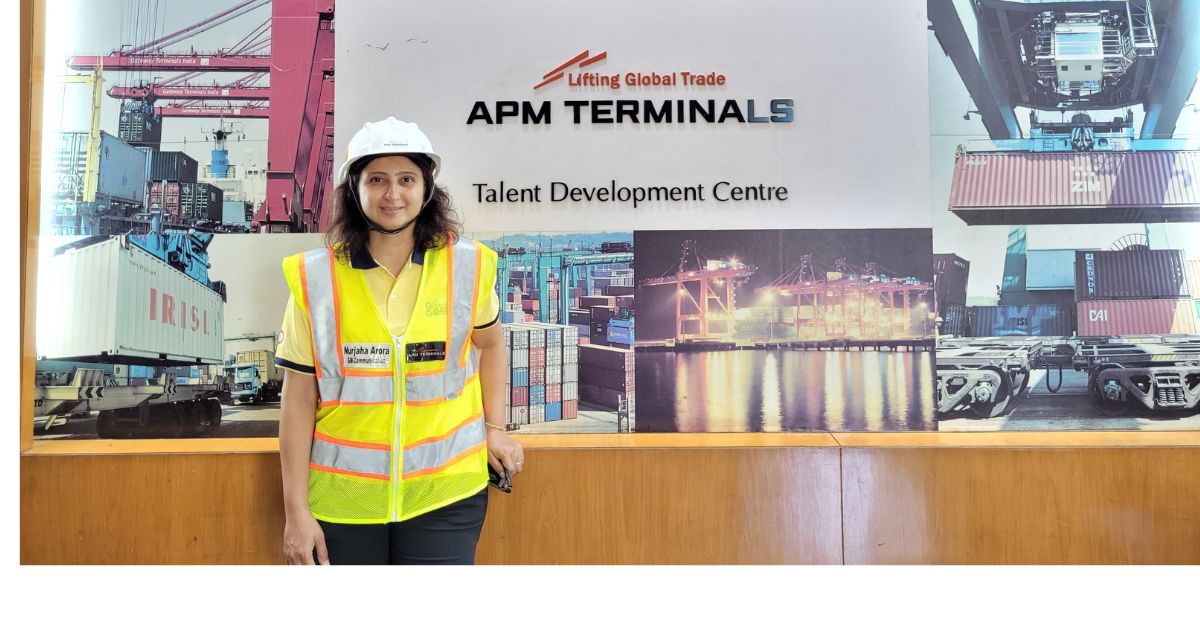By Nurjaha Arora, Head of Corporate Communications – APM Terminals India
As the economic heartbeat of global trade, embracing gender equality is a strategic advantage as it adds to the diverse pool of prospective skills, experience of women promises to infuse efficiency, innovation, and overall success of this vital industry. It is disheartening to note that, despite 7517 km long coastline being home to 12 major ports and more than 200 minor ports, women are underrepresented in the port industry in India, much lower at operational and leadership roles. In the Indian port business, women only make up about 12% of the workforce; primarily employed in clerical and administrative tasks, with much fewer in technical, operational, and leadership responsibilities. In actuality, women make up less than 2% of India’s 140 million logistics workers.
Nonetheless, remote locations, travel, and safety concerns, particularly during night shifts, are some of the major deterrents that prevent women from entering the port industry. In addition, there is a shortage of expertise and skills as well as a lack of understanding about employment options in the field. There is occasionally discrimination against women in the hiring process, and family pressure to choose safer career paths. To overcome such challenges, here are some measures that can be explored for more inclusive environment for women in the port industry:
Mentorship and Sponsorship Programs: Mentorship and leadership development programs play a crucial role in nurturing talent and empowering women to pursue careers in the port industry. By pairing aspiring female professionals with experienced mentors, may provide invaluable guidance, support, and information on various career opportunities in the industry and networking opportunities. They help break down barriers, instil confidence, and pave the way for women to assume leadership roles within the industry.
Initiatives like the “Women in Maritime Leadership” program by the International Maritime Organization (IMO) empower women through peer-to-peer learning and networking. Furthermore, driving change in the port industry is education and upskilling. Educational programs, workshops, and seminars are being organised to raise awareness about gender biases and to foster an inclusive environment. By promoting dialogue and challenging stereotypes, these initiatives aim to create a culture where both men and women feel valued and respected for their contributions.
Adopting appropriate retention strategies: There is a need to re-examine recruitment and retention strategies to attract and retain aspiring women in the industry. Flexible work arrangements, childcare support, and equal pay policies are just some of the measures being implemented to create a more inclusive workplace. By addressing the unique challenges faced by women, such as work-life balance and career advancement opportunities, port organizations can ensure that talented individuals are not hindered by gender-based obstacles. The “International Labour Organization (ILO) Maternity Protection Convention” sets minimum standards for maternity leave and benefits, paving the way for more inclusive workplaces.
Inclusive Work Environment: Companies are providing safe transportation facilities to women who need to travel to remote locations, especially outside regular hours. Major companies are sponsoring shuttle services, carpooling facilities for women working in this remote regions, especially outside regular hours. Safety is of paramount importance in the port industry. Women friendly infrastructure like well-lit and monitored working areas, parking lots, and transportation routes are important. ation options for women who work late or irregular shifts, reducing the need for travel during vulnerable times. By implementing robust security measures for women working at ports will allow more women to enter the industry.Partnering with local law enforcement for awareness and support in these areas make women safer and secure in their work operations. Also, organisation provide safe on-site or nearby accommod
Raising Awareness on Zero Tolerance to Harassment and Discrimination: A critical aspect of promoting gender equality in the port industry is fostering a culture of zero tolerance. Building a culture of zero tolerance towards harassment and discrimination through sensitization workshops and robust reporting mechanisms creates a safe and respectful work environment for all. The “Maritime Anti-Corruption Network (MACN)’s” Code of Conduct outlines zero tolerance for any form of discrimination, promoting inclusivity at sea and in ports. By holding individuals and organizations accountable for their actions, the industry sends a clear message that harassment and discrimination will not be tolerated.
External partnerships: In addition to internal initiatives, partnerships with external organizations and stakeholders are helping drive progress in promoting gender equality in the port industry. Collaboration with government agencies, non-profit organizations, and academic institutions can facilitate knowledge-sharing, resource mobilization, and advocacy efforts. By leveraging collective expertise and resources, stakeholders can work together to address systemic barriers and drive meaningful change.
While strides have been made in fostering gender equality within the port industry, the journey is far from complete. The ongoing commitment to collecting and analysing gender-disaggregated data, promoting collaboration, and celebrating female role models is essential to sustaining progress. By embedding these initiatives into the industry’s DNA and cultivating a culture of inclusion, ports can unlock the full potential and chart a course toward a more equitable and prosperous future. Promoting gender equality is imperative through which an industry can harness the power of diverse teams to drive innovation and efficiency in a competitive global marketplace. As we set sail towards this transformative vision, embracing equality becomes not only a duty but a beacon guiding the port industry towards a successful future.







